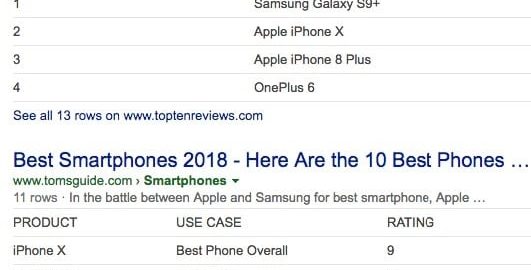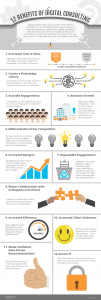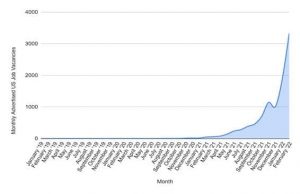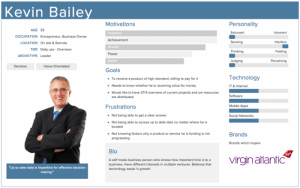— October 8, 2018
Since Google maintains the largest market share, often times, it’s easy to forget about the fact that other search engines exist. And while you do want to optimize for Google, sometimes, it’s easier to optimize for Bing. Honestly, the two appear to share many of the same ranking factors, but there are some slight differences. Comparing rankings for the same keyword across the two search engines will generally give you the same results, but with variations in order. Let’s take a look at some local Search Engine Optimization tips for Bing.
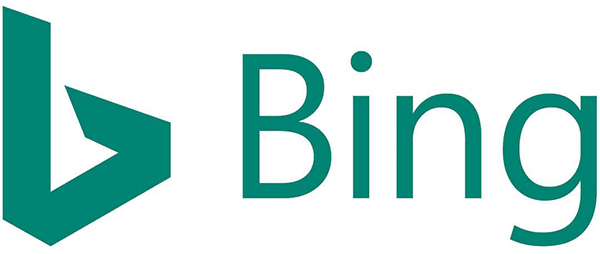
Claim Your Business Listing
Bing has a business directory similar to Google My Business. You’ll need to claim your listing there, and make sure the data is correct, up to date, and uses the same NAP as in your Google My Business listing. Go above and beyond the basics, and include an image, your hours of operation, and categories. Restaurants can integrate with OpenTable to make reservations easy. Other businesses can integrate with Groupon or Bing Group Deals to share deals with users. As you develop citations with Google My Business, your Bing Local listing will also need to have citations to rank well. Rely on local directories, as well as directories in your vertical, too.
Focus on Your Backlink Profile
A study of 300,000 websites showed that 52 to 53% of the backlinks of websites that ranked in the top 30 results on Bing contain keywords in the anchor text. This is 10% more than the results for Google. Just 2% of the backlinks on the pages ranking under the top 30 on Bing contained a stop word, whereas this is 10% on Google.
What this means is on Google, simply getting the quality links from authoritative domains is enough to do the trick. But, Bing wants you to grow the link profile with exact match anchor text and do-follow links. Typically, where Bing is concerned, the quantity of backlinks will overpower the quality.
On-Page SEO Matters More
Where this is concerned, Google’s algorithm is far more sophisticated. Bing continues to focus on some of the old factors, such as exact match domains, exact keyword usage in headings, title tags, and meta descriptions.
Let’s take a look at the difference between “best smartphones” in Google and “best smartphones” in Bing.
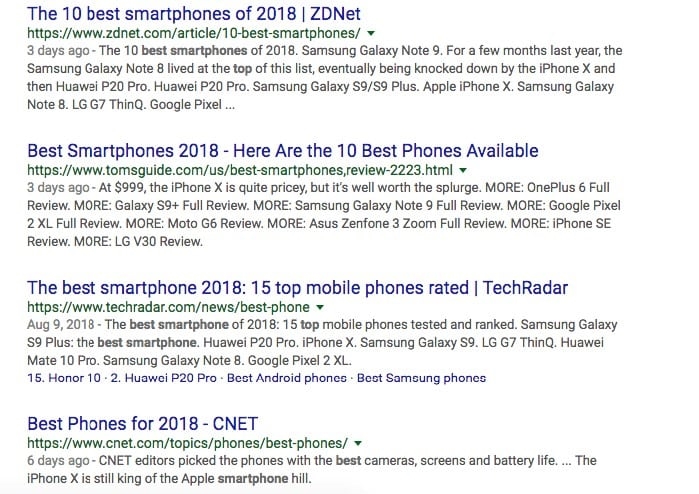
Google’s first result is ZDNet, a quality source for all things technology related. Notice there’s no exact keyword match in the URLs or the meta descriptions in any of these results.

Though we don’t have an exact match domain, Bing’s results are a bit different, because there is an exact match in the page name. The ZDNet page still shows up on page one of Bing, just further down that we see it on Google.
I am by no means suggesting you go out and buy exact keyword match domains to increase your odds of ranking with Bing – just saying that it seems to be a larger part of their algorithm than it is for Google today.
Create High Quality Content
This is a major rule for ranking well on either Bing or Google. Search engines are in the business of making sure people can find what they need and what they want, quickly. This means they will favor websites that provide unique and engaging content that address reader queries. This doesn’t mean stuffing keywords into the content wherever and whenever possible.
Bing tells you what they consider quality content. They want the content to be trustworthy, useful, and well presented. What does that mean? Let’s break it down.
- Mention the author of the content and provide sources for your information.
- Answer the query in as much detail as is required by the query. Make sure it helps the users.
- Format and present the content well, making sure there is a clear distinction between your content and any ads you may have on your website.
Failure to comply with all three of these pillars will prevent your content from ranking well on the Bing search engine. Use images and video where necessary to enhance your content for your readers. Ultimately, Google and Bing want you to serve the readers well, because by doing so, you make their job easier.
Use Schema Markup
I’ve already written an in-depth post about Schema markup, also known as structured data. If you’re not using it on your website already, check out that post to learn more about what it is, why you should use it, and how to get started with it.
Beef Up Your Social Media Efforts
Social media signals aren’t a direct ranking factor for Google, but Bing on the other hand admits social signals are part of their algorithm. They’ve officially said they use social shares to understand if a page is popular with users. If your content is shared widely, it sends positive signals to Bing, meaning that your social influence could lead to an increase in your organic rank in the long run.
According to a Search Metrics study, social signals correlated with higher organic rankings. Heads up, though. Using tactics such as buying fake followers won’t help you get ahead. It’s not the size of your following that counts – it’s the interaction that matters. Fake followers won’t like, share, or comment, so they are useless to you.
Use Bing Webmaster Tools
If you’ve not already done so, set up your website in Bing Webmaster Tools. It will help you see the keywords you’re ranking for, indexed backlinks, links you need to disavow, and more. You can submit your sitemap, and subscribe to alerts about your website.
Digital & Social Articles on Business 2 Community
(43)
Report Post